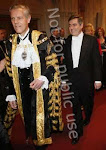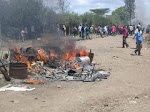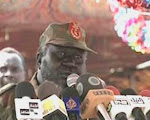The month of January 2008 witnessed a number of useful political debates in the Sudan – at least according to http://ohiyok-newsanalysesonline.blogspot.com and http://ohiyok-oduho.blogspot.com/2008/01/my-articles-2003-2007_07.html respectively. The first one is the decision by the Government of South Sudan (GoSS) to appoint a Mayor for the town of Juba, the capital of South Sudan. The second one is the proposal for confederation in the Sudan made by Lt-Gen. Malik Agar, the Deputy Secretary-General of the Sudan People's Liberation Movement/Army (SPLM/A), Northern Sector, and Governor of Southern Blue Nile State (SBNS). The latter was already discussed and could be found in any of the above Blogs or simply follow this internet link: Separation as an Option in South Sudan Versus the Dangers Presented by Kenya and Need for Confederation. This, thus, leaves us with the former, appointment of Mayor for the town of Juba, to discuss.
What's Mayor?
Mayor is quite a common term, especially in countries formerly colonised by the British Empire and that includes the United States of America. It is doubtful that everyone in the Sudan, though a former colony of the British Empire, knows what the term Mayor means. For this good reason, a definition of the term is important to help Sudanese readers of this website to follow this analysis.
The term Mayor is an English noun that denotes head of a Municipality (Collins Paperback Dictionary & Thesaurus (386:2000)). Translated in our African or South Sudanese context, Mayor could be defined as 'an elevated position of a Paramount Chief to whom all senior chiefs in the territory report.' The senior chiefs are elevated to the positions of Counselors. The Paramount Chief, who chairs the elevated Counselors, becomes Mayor of the Mayoral Territory.
Mayoral Territory
Mayoral territory in the context of this discussion refers to an entity called City or Municipality with a local self-government. In countries like Kenya and Uganda, the government decides, from time to time and after thorough evaluation, to elevate provincial capitals to Municipalities (cities) that are governed by Mayors independent of the Commissioner. In this elevated province, the chairman of Provincial Town Council becomes Mayor (Governor of the Municipality) and his/her Counselors or Provincial Town Council MPs elevated to the status of City or Municipality Counselors (MPs of the local self-government). It should be noted that in former British colonies, there are District, Provincial and Municipality Town Councils.
The position of Mayor links the grassroots to the executive supposedly through the commissioner to the ministry of local government. The whole process is a full swing local government whose parliament is the council and the executive is the mayorship with a cabinet of counselors in charge of various local responsibilities and one deputizing the Mayor. The Municipality also has a local police force called in Kenya as 'Askaris.' The City Askaris in Kenya have the power to arrest anyone violating the regulations or laws of the Municipality.
A number of South Sudanese did comment on the appointment of a Mayor in Juba town. One of them said: "Southern Sudan does not need mayors at the moment", (Khartoum Monitor, January 13th, 2008, p4). This analytic piece is not discussing those who are for or against the appointment of a Mayor for the town of Juba but looks at how could this work in South Sudan. However, it is worth mentioning that the Sudan has a very well-established local government system. This system is represented by the ministry of local government renamed the Federal Rule Chambers (Ministry).
Why not 25 Mayors instead of one?
As mentioned above that the Sudan has an established system of local government, it is tempting to say that the Sudan is ripped for 25 Municipalities and Mayors. Like in Kenya, the Federal government of the Sudan had issued executive orders or decrees to create 26 states (now minus one state). Since these 25 states have the three arms of the government, including the local government led by the commissioners who represent their affairs in the State Council of Ministers, the states, as sovereign as they are, deserve one Mayor each. The capitals of the 25 states in the Sudan are more than Municipalities. In the UK and Kenya for example, except London and Nairobi, any other Municipality does not have a sovereign government. But it should be realised that only 25 commissioners in the Sudan head the States' capitals and represent the Municipalities in the States' Council of Ministers.
Financial constraints in appointing Mayors
One South Sudanese did already express his disagreement with the appointment of a Mayor for the town of Juba. He said: "instead of paying additional salaries to a Mayor, the South needs the cash targeted for its development", (Khartoum Monitor, January 13th, 2008, p4). He is absolutely right in the sense that the South needs development at the moment and not Mayors. It should be noted, however, that Municipalities are not only beneficial but are good sources of income that would help in the development of South Sudan. There are resources at the local levels but most of it gets siphoned by the central government and the local people are left helpless. Thus the creation of Municipalities led by Mayors in the Sudan should be encouraged as they would offer the local people the opportunity to participate in their own development.
Other benefits
The creation of Municipalities and appointment of Mayors first and foremost means further devolution of power from the centre to the periphery. The more power is devolved by any central government to the people the more such government moves towards a democratic transformation. The power to choose own local leadership and the actual participation in the management of local affairs is by itself a useful transformation of any country into a democracy.
The positions of Mayors throughout the country would obviously need lots of Sudanese pounds to be instituted. But this would only be for a short term. In the short term the Municipalities would not have enough cash to manage their affairs but once they are established they would thrive like the cities of London, New York and Nairobi. They will make enough money from local revenues, especially ticketing of parking lots and other Municipal land-related charges throughout the state(s). The Municipality of Metropolitan London makes enough money from revenues that could run it almost independently on annual basis. Instead of raising more than £100 million during the congestion-charging scheme’s first year, congestion charging contributes £50 million of net transport benefits to London’s economy per year, mainly through quicker and more reliable journeys for road and bus users, (http://www.citymayors.com/report/congestion_charge.html).
Conclusion
The decision to appoint a Mayor for the town of Juba is indeed a welcome one but should not be left at the level of Juba alone. It should be applied to all the cities in South Sudan. This is really important, especially in the wake of corruption that reaping apart the South Sudanese society at both GoSS and States' levels.
It is important to look at the creation of Municipalities and appointment of their Mayors as an investment rather than a burden to the people of South Sudan. It should also be viewed as a democratic transformation and not hegemonic extension. South Sudanese, known for democratic inherence within them, will succeed more in Municipalities than in GoSS and State governments. Thus, let lack of money be the reason for not establishing Municipalities and appointing Mayors in the Sudan or South Sudan for that matter.
Tuesday, February 19, 2008
Appointment of Mayor for Juba Town is Welcome, Should Apply to 25 States
Subscribe to:
Post Comments (Atom)







No comments:
Post a Comment